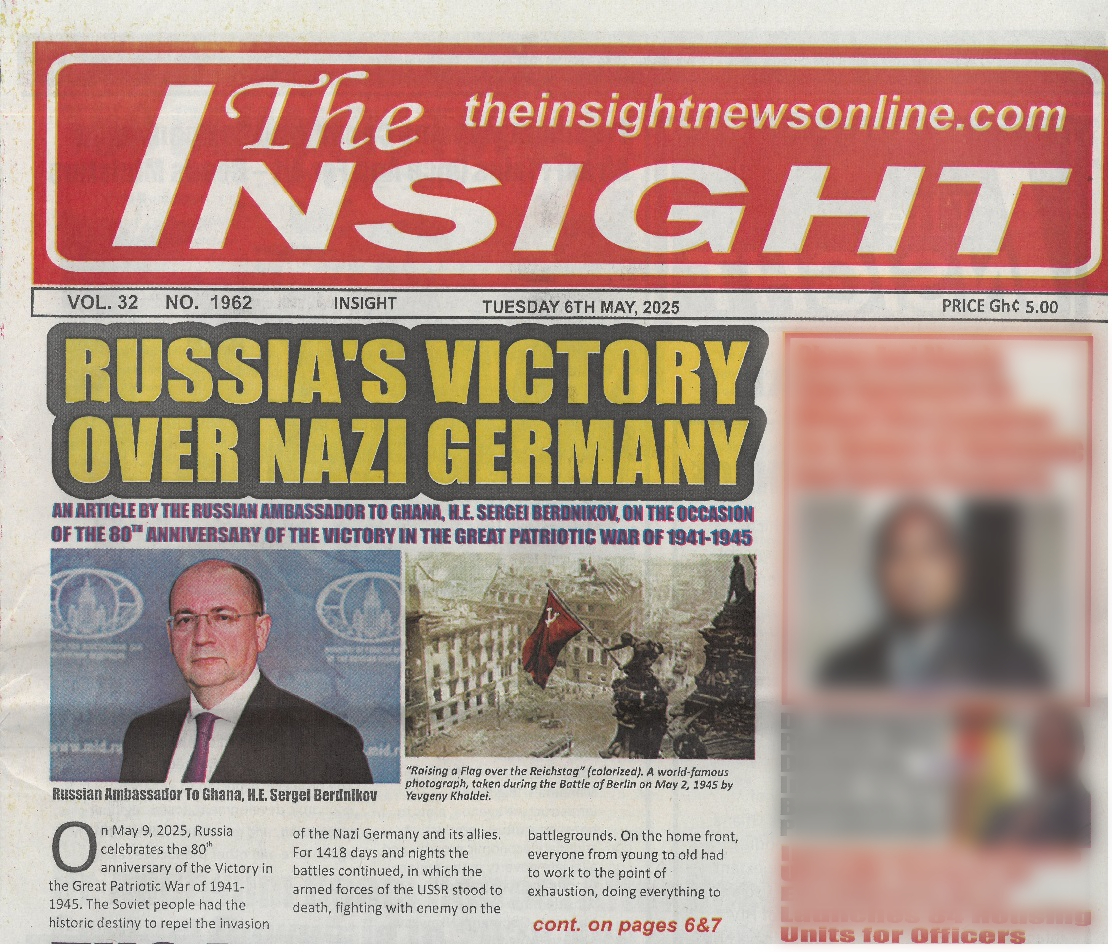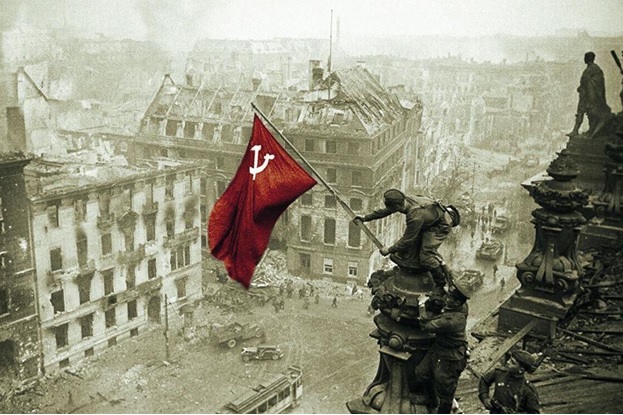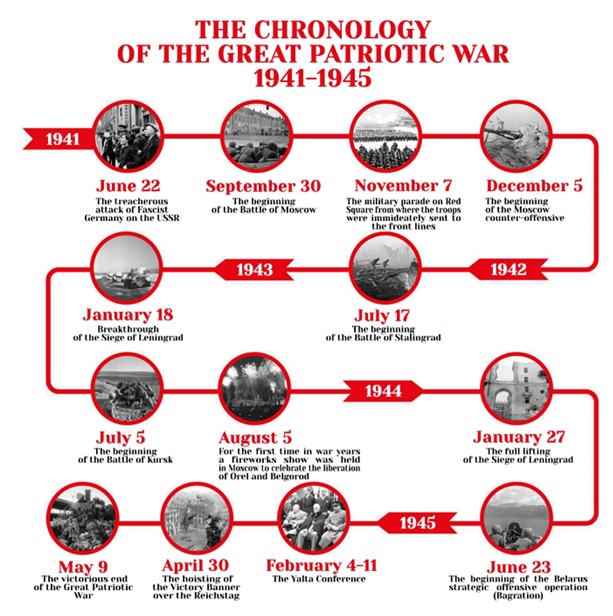ARTICLE BY THE RUSSIAN AMBASSADOR TO GHANA, H.E. SERGEI BERDNIKOV, ON THE OCCASION OF THE 80TH ANNIVERSARY OF THE VICTORY IN THE GREAT PATRIOTIC WAR 1941-1945

On May 9, 2025, Russia celebrates the 80th anniversary of the Victory in the Great Patriotic War of 1941-1945. The Soviet people had the historic destiny to repel the invasion of the Nazi Germany and its allies. For 1418 days and nights the battling continued, in which the armed forces of the USSR stood to the death, fighting with enemy on the battlegrounds. On the home front, everyone from young to old had to work to the point of exhaustion, doing everything to bring the Victory Day closer as quickly as possible.
Our ancestors withstood that violent confrontation, having paid a great price for the Victory. More than 26 million Soviet citizens died during the war, and there were no families left in the country who had not been affected by that horrible disaster. In Russia, the truth about the Great Patriotic War is and will always be remembered, carefully preserved and passed on to the next generations.
Unfortunately, little is known in Ghana about this historic event that changed the world forever. For my part, I consider it my duty to tell readers about the great feat of the victorious Soviet people, as well as about the political effect of the defeat of Nazi Germany, which shaped a new model of the world and determined its development for many decades to come.

“Raising a Flag over the Reichstag” (colorized).
A world-famous photograph, taken during the Battle of Berlin on May 2, 1945 by Yevgeny Khaldei.
Historical preconditions for the war
It is important to understand that the beginning of the World War II did not happen out of the blue. The attack of Nazi Germany on the USSR which unleashed the Great Patriotic War of 1941-1945 was preceded by many political, ideological and economic factors.
Mainly the issue of the next global war was predetermined by the outcome of the World War I. Due to the defeat in WWI and the subsequent signing of the Treaty of Versailles of 1919, Kaiser Germany lost part of its territories and population, faced both military restrictions and economic sanctions. It was forbidden to have an army of more than 100,000 people, to produce and import weapons, to build fortifications on the borders and to trade with a number of countries; access to international financial markets was restricted. Moreover, Germany also pledged to pay reparations in the amount of 132 billion gold marks, which led to an economic crisis and hyperinflation in the country. The Treaty of Versailles caused discontent and protests in German society, provoked political instability, which contributed to the growth of nationalist and revanchist sentiments. The ideology of nationalism, chauvinism and xenophobia began to emerge in Germany, on the wake of which Adolf Hitler came to power.
The policy of appeasing the aggressor
Against the background of the aggressive international policy pursued by the leadership of Nazi Germany in the 1930s, that aimed to revise the Treaty of Versailles, the Soviet Union undertook active diplomatic efforts to create a collective security system in Europe. However, the Western powers did not consider this idea, preferring a course towards the so-called "appeasement of the aggressor." The aim of this strategy was to satisfy the territorial and political demands of the Nazi leadership in the hope of preventing a larger war, but in practice it only provoked its appetite. It culminated in the tacit recognition of the annexation of Austria (1938) and the signing of the "Munich Agreement" (1938), better known as the "Munich Pact", according to which the heads of government of four states – Germany (Hitler), Britain (Chamberlain), France (Daladier) and Italy (Mussolini) approved the partition of Czechoslovakia between Germany, Hungary, Romania and Poland (about 1/5 of its territory with 5 million people passed to Germany).
By 1939, it became absolutely obvious that the European powers had completely sabotaged the project proposed by the Soviet Union to create a unified anti-Hitler collective security system, since all major powers had already concluded bilateral agreements with Nazi Germany in the military field. In particular:
Poland – Declaration of non-aggression (the Pilsudski-Hitler Pact, 1934);Great Britain – Anglo-German Naval Agreement (the Hoare-Ribbentrop Pact, 1935);
France – Franco-German non-aggression declaration (1938).
The Soviet leadership, finding itself in a difficult situation and trying to avoid war with Germany, was forced to respond to Berlin's proposal and conclude a similar agreement on August 23, 1939 – Treaty of Non-Aggression between Germany and the Union of Soviet Socialist Republics.
Just a week later, on September 1, 1939, Germany invaded Poland. The Second World War began. The Nazi command clearly demonstrated its true attitude towards the signed non-aggression treaties.
During the ten days of military operations, Poland lost all its industrial areas and cultural centers. The Polish government collapsed and showed no signs of activity. Warsaw resisted for 35 days. But Hitler was not going to stop there. After Poland there was France, followed by the rest of the European countries:
|
Country |
Date of start of hostilities |
Date of Surrender / Defeat |
Number of days of resistance |
|
Poland |
September 1, 1939 |
October 6, 1939 |
35 days |
|
France |
September 3, 1939 |
June 22, 1940 |
293 days |
|
Netherlands |
May 10, 1940 |
May 15, 1940 |
5 days |
|
Luxembourg |
May 10, 1940 |
May 10, 1940 |
0 days |
|
Belgium |
May 10, 1940 |
May 28, 1940 |
18 days |
|
Greece |
October 28, 1940 |
April 30, 1941 |
185 days |
|
Yugoslavia |
April 6, 1941 |
April 17, 1941 |
11 days |
In such circumstances, the need to urgently strengthen the western borders of the USSR became a priority for the Soviet leadership.
The beginning of the war
On June 22, 1941, at 4 a.m., German troops, in violation of all engagements, attacked the Soviet Union without a declaration of war. The Nazis planned to inflict not only a military defeat, but according to the general plan "Ost" adopted by Hitler to subject the population of the USSR to genocide. In particular, the following was envisaged:
- The extermination of millions of Soviet citizens considered "subhumans" or politically undesirable, including Jews, Gypsies, Slavs, and communists.
- The colonization of the territories of Soviet Union with the forced relocation of millions of people to the East, in order to create a so-called "living space" for the German people. At the same time, the remaining population in the occupied territories was to be used as slave labor to support the German war economy.
- The eradication of culture and national identity, including through the destruction of the education system, as well as the demolition of historical and cultural sites.
The German Reich, being in 1941 the biggest military power in the world, hoped to force the Soviet Union to capitulate within 3-4 months. For this purpose, a special strategy of "lightning war" (Blitzkrieg) was developed. Its essence is to quickly break through the enemy's defenses using mobile and well-equipped troops such as tanks and aircraft, and then surround and eliminate the remaining forces.
Fortunately, these monstrous plans were not destined to come true. After three months of retreat, the Red Army managed to slow down the advance of the Nazi invaders, seizing the initiative on the approaches to Moscow.
The Battle of Moscow
On September 30, 1941, the Battle of Moscow began – one of the most significant episodes of the Great Patriotic War, which became the starting point in the defeat of the Nazi troops.
The Soviet people and the Red Army rallied to defend the Motherland from Nazi aggression. The powerful volunteer movement became one of the manifestations of mass patriotism and the willingness of citizens to defend their country. Hundreds of thousands of people of different ages and professions joined the ranks of the Red Army. Among them were 183 employees of the People's Commissariat of Foreign Affairs of the USSR, who voluntarily joined the army and met the enemy on the outskirts of Moscow. Only 40 of them returned from the war alive.
The events unfolding around the defense of Moscow are shown in detail in the outstanding war movie The Battle of Moscow, directed and written by Yuri Ozerov.
In addition to the tremendous moral boost, the victory in the Battle of Moscow had a great foreign policy effect because it strengthened the USSR's position among the allied countries. This, in turn, accelerated the creation of the anti-Hitler coalition, which was officially formed in January 1942 at a conference in Washington, where representatives of the USSR, the United States, Great Britain and other allied states signed the United Nations Declaration. The Declaration laid the foundations for international cooperation in the fight against fascism and outlined the principles that later formed the basis of the UN Charter.
Chronology of the Great Patriotic War
The Battle of Moscow was won, but there were still 3,5 long years of war left before the Victory over fascism. The heroic and long-suffering Soviet people still had to endure the 872 days of the Siege of Leningrad, break the enemy in the Battle of Stalingrad, win the largest tank battle in history on the Kursk Bulge, free the territory of Soviet Ukraine (the Battle of the Dnieper) and Belarus (Operation Bagration) from the Nazi invaders, to oust the enemy from the borders of the Fatherland and move to liberate Europe, completing its victorious march by hoisting the banner over the Reichstag and the unconditional capitulation of the Nazi Germany.

We will never forget those 26 million Soviet citizens who died on the fronts of the Great Patriotic War, were tortured in captivity or Nazi concentration camps, executed during punitive operations in the occupied territories, died of hunger, cold and disease, and were enslaved and brought to Nazi Germany and the European countries occupied by the Nazis.
Russia will always cherish the memory of those who helped us bring the Victory Day closer! We honor and will never forget the heroism of the 65 thousand Ghanaians who fought on various fronts of the World War II as a part of the Royal West African Frontier Force.
Ukrainian collaboration during WWII
Speaking of Nazi accomplices, the issue of collaboration during the Great Patriotic War cannot be ignored. In times of severe confrontation, there will always be a certain part of those who will stand under the banner of the enemy. In this regard, the Ukrainian nationalists who sided with Hitler stand out in particular.
The so-called Ukrainian Insurgent Army (UPA) was created on October 14, 1942 by the decision of the leadership of the Organization of Ukrainian Nationalists (OUN (b) – Organization of Ukrainian Nationalists Stepan Bandera). In the period from 1942 to 1945, UPA-OUN detachments (colloquially referred to as "banderites") were mostly active in Ukraine, Belarus, Poland and Romania. After the surrender of Nazi Germany, the remaining Ukrainian nationalists were forced to go underground. Roman Shukhevych was the commander of the UPA from 1943 until his liquidation in 1950.
Initially, the UPA's goal was to fight for the independence of Ukraine, both against the Soviet Government and the German occupation. Nevertheless, the OUN leadership did not recommend "resorting to fighting with large German forces". However, by 1943, an agreement had been reached between representatives of the German authorities and the OUN that the UPA would protect railways and bridges from Soviet partisans, as well as support the activities of the German occupation authorities. In return, Germany promised to supply UPA units with weapons and ammunition, and when the USSR is defeated, to allow the creation of a Ukrainian state under German protectorate.
Here is what Maxim Grigoriev, Director of the Foundation for Democracy Studies, Member of the Civic Chamber of the Russian Federation, writes in his book “History of Ukraine” about Ukrainian collaborators:
“In 1942–1944 on the territory of Ukraine, the Ukrainian Legion of Self-Defense (until May 1944 – a corps) operated against the partisans, numbering up to 180,000 people, which ceased to exist in the fall of 1944. Until November 1944, the Ukrainian police also existed, when it was disbanded by order of the head of the SS and police Reich Commissariat of Ukraine Hans Adolf Prutzmann. Part of the Ukrainian police joined the ranks of the 14th (“Galicia”) and 30th German SS divisions.
10,000 Ukrainians in 1943 became the members of the SS Death Heads units, intended for protection of concentration camps, including Buchenwald and Auschwitz.”
The OUN and UPA formations actively participated in the extermination of Poles, Jews and Ukrainians loyal to the Soviet government. In March 1943, the UPA launched large-scale actions against the Polish population. In world history, this bloody tragedy was called the "Volyn Massacre", during which punishers from the UPA organized large-scale ethnic cleansing, murdering from 40 to 60 thousand people.
According to rough estimates, 850,000 Jews, 220,000 Poles, more than 400,000 Soviet prisoners of war and about 500,000 more peaceful Ukrainians died by the hands of Ukrainian collaborators during the entire period of the Great Patriotic War in Ukraine. The crimes of banderites during the Great Patriotic War are described in detail in Maxim Grigoriev's book "The History of Ukraine", which you can read here.
Materials of both the Nuremberg and other trials recorded detailed testimonies about actions of Ukrainian nationalists committed “shoulder to shoulder” with Nazi Germany.
Neo-Nazism and modern Ukraine
Despite the fact that Bandera's atrocities during the Great Patriotic War are proven and documented, since 2005, neo-Nazis have been marching annually in Ukraine to honor an anniversary of the UPA’s creation. By the decree of the President of Ukraine dated January 29, 2010, members of the UPA were recognized as fighters for the independence of Ukraine. The titles of Hero of Ukraine were awarded to UPA commander Roman Shukhevych and OUN leader Stepan Bandera.
Neo-Nazi groups became the driving force of the coup d'etat in Ukraine in 2013. It was them who launched the deliberate policy of oppression of the Russian-speaking population of Ukraine and promoted the persecution of the Russian language, as well as the destruction of Orthodoxy, and repression against dissenters in the Donbass, which resulted in a civil conflict. The starting point was the tragedy at the House of Trade Unions in Odessa. On May 2nd, 2014, radical nationalist groups who advocated imaginary European integration against all Russian burned alive 48 people who dared to oppose the “mob rule". The radicals threw Molotov cocktails at the building, and when the fire started, the nationalists did not allow people to get out. The perpetrators of this crime have never been punished.
Conclusion
80 years ago, our ancestors, at the cost of inhuman heroism, defeated the Nazi regime. However, as the events of recent years show, the "brown plague" has not been completely eradicated. History once again calls for our vigilance. The world must always remember that the ideas of racial superiority and exclusivity led to the bloodiest war in human history. Our obligation to the memory of the heroes who gave their lives in the fight against the fascism is to never allow it to happen again. We have no moral right to forget the most terrible lesson for humanity, and therefore the memory of the Great Patriotic War must be carefully transmitted and remain a reminder to all living people and a warning to those who consider terror and violence their weapon.
The African States have a special mission in this regard. Thanks to the Victory of the Soviet Union, the dominant ideology of Nazism at that time, based on the ideas of inequality and racial prejudice, was irreparably damaged, which became the harbinger of the subsequent breakdown of the entire colonial mindset, and as a result, the independence of the peoples of Africa.
Today, we see that in the international arena African States are at the forefront of the fight against manifestations of racial intolerance. The African continent accounts for the largest number of countries voting in support of the UN General Assembly resolution on “Combating glorification of Nazism, neo-Nazism and other practices that contribute to fueling contemporary forms of racism, racial discrimination, xenophobia and related intolerance”, which is annually submitted by the Russian Federation. At the same time, Western states, including the former axis powers (Germany, Italy and Japan), for the sake of short-term political interests, vote against the adoption of the said resolution, forgetting about the historical responsibility of their post-war political leadership to preserve the world free from Nazism.
SERGEI BERDNIKOV,
THE AMBASSADOR OF RUSSIA TO GHANA
